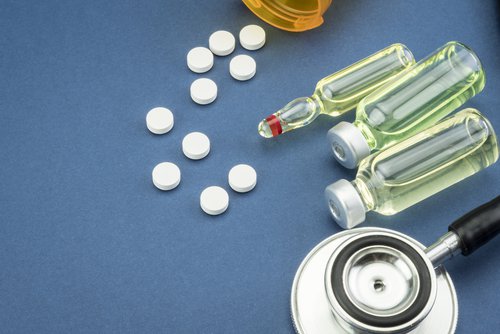#AANAM – IV Therapy May Be More Effective Than Oral Treatment in Younger RRMS Patients, Research Suggests
Written by |

Infusible disease-modifying treatment — that is, therapies given intravenously — might have greater benefits for younger people with multiple sclerosis (MS) than oral ones, new research suggests.
The research was presented at the ongoing American Academy of Neurology (AAN)’s annual meeting (May 4-10) by Brandi Vollmer, MPH, a research assistant in neurology at the University of Colorado. The presentation was titled “Higher Efficacy Therapies Appear to have a Disproportionately Larger Effect in Younger Patients with Multiple Sclerosis.”
Previous research by the same group suggested that infusible, or IV, therapies — specifically rituximab (a therapy prescribed off-label to MS patients) and Tysabri (natalizumab; an approved MS therapy marketed by Biogen) — were more effective at preventing disease progression than oral MS therapies, namely Gilenya (fingolimod, marketed by Novartis) and Tecfidera (dimethyl fumarate, marketed by Biogen).
However, it is hard to predict how any specific patient will respond to a given therapy — for instance, some people with MS do very well on oral therapies. Thus, the researchers wanted to gain a clearer idea about which patients would most likely benefit from a certain type of treatment.
Researchers analyzed data from 1,004 patients with relapsing-remitting MS (RRMS) who were treated with one of these four therapies at the Rocky Mountain MS Center at the University of Colorado.
About half of the patients (509) took oral therapies (Gilenya and Tecfidera), while the rest (495 patients) were prescribed infusible therapies (Tysabri and rituximab). Patients were followed for up to two years, or until they stopped treatment.
The team specifically assessed disease activity over time — defined as either a clinical relapse or the appearance of new lesions in the brain, assessed through magnetic resonance imaging (MRI).
As in their previous research, the team found that, overall, a lower proportion of people given IV therapy experienced disease activity (21.2%) as compared with those taking oral medications (36.3%).
With new lesions and clinical relapse, in particular, the values were lower in the infusible-treated group as compared with the oral group. In the patients given IV therapy, 23.3% had lower values of new lesions, as compared with 34.8% in the oral group. For clinical relapse, the values were 6.1% in the IV group versus 12% in the oral group.
When researchers examined the data in more detail, they found that patients with disease activity who were taking oral therapies were more likely to be younger (less than 45 years old), than patients on oral therapy who did not experience disease activity.
However, age showed no association with whether patients were more or less likely to have disease activity in the IV-therapy group.
Researchers found that the likelihood of experiencing disease activity with oral versus infusible therapies was greater in younger patients.
“Oral-group patients had nearly two times greater odds of experiencing disease activity in the less than 45 age group, compared to infusible-group patients. But, when we look in the greater than 45 age group, this association disappears,” Vollmer said.
Although the results only show an association — and not a cause-and-effect — the data suggest that younger MS patients may be more likely to experience clinical benefit from high-efficacy IV therapies.
“Higher efficacy therapies appear to have a disproportionately larger effect on younger patients,” Vollmer concluded.
The results also suggest that “there is a benefit to treat patients of 45 years of age and older,” she added.


